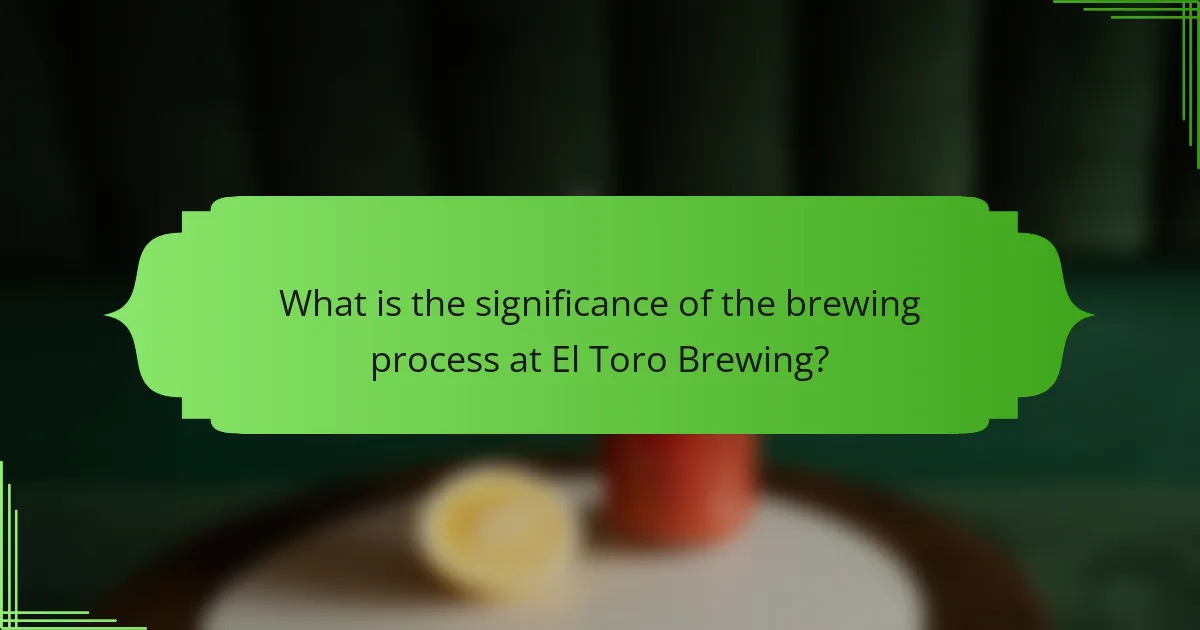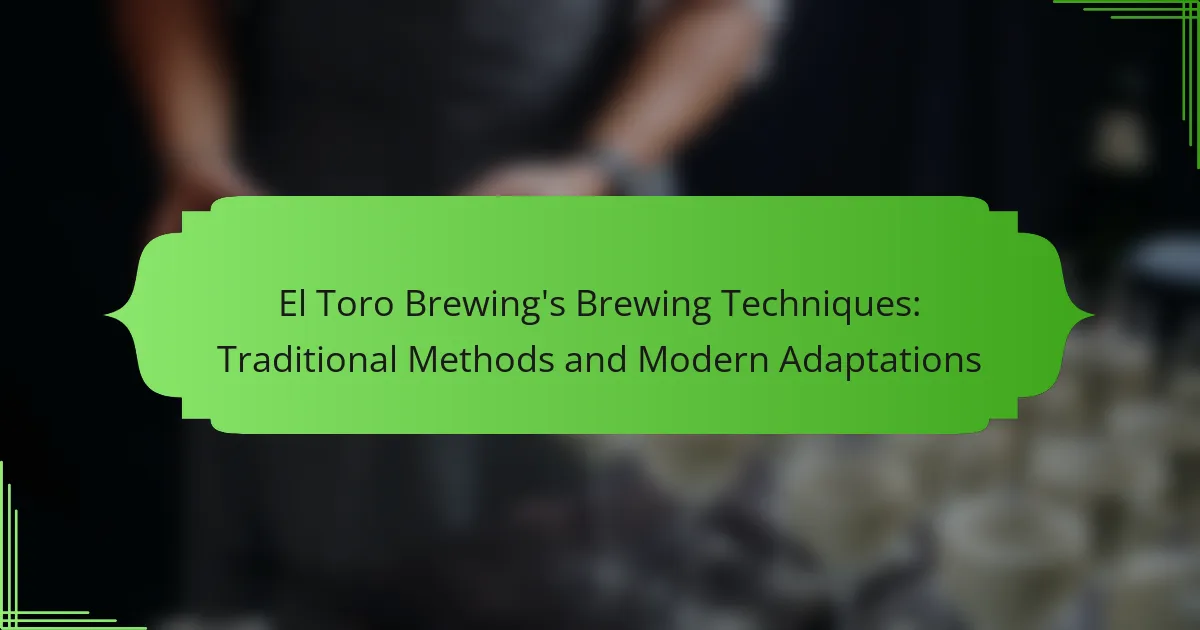El Toro Brewing is a brewery that employs a blend of traditional and modern brewing techniques to create high-quality beers. The brewing process includes a specific mashing process that extracts sugars from malted grains through precise temperature control, as well as a focus on fermentation using selected yeast strains. Unique hop varieties are incorporated to enhance aroma and bitterness, while locally sourced ingredients support freshness and local agriculture. The combination of meticulous techniques and innovative methods, such as dry hopping, reflects El Toro Brewing’s commitment to craftsmanship and the balance of heritage and innovation in their brewing practices. Enthusiasts can engage with the brewing community through tours and tasting events to experience these techniques firsthand.

What are El Toro Brewing’s Brewing Techniques?
El Toro Brewing employs a combination of traditional and modern brewing techniques. They utilize a specific mashing process to extract sugars from malted grains. This process involves heating the grains in water at precise temperatures. El Toro Brewing also emphasizes the importance of fermentation. They use specific yeast strains to achieve desired flavor profiles. Additionally, they incorporate unique hops varieties for aroma and bitterness. Their brewing techniques are designed to enhance the overall quality of the beer. These methods reflect a commitment to craftsmanship and innovation in brewing.
How do traditional brewing methods influence El Toro Brewing?
Traditional brewing methods significantly influence El Toro Brewing’s processes and flavor profiles. These methods emphasize quality ingredients and time-honored techniques. El Toro Brewing utilizes traditional fermentation practices that enhance the beer’s complexity. The brewery often incorporates local grains and hops, reflecting regional characteristics. Additionally, traditional aging methods contribute to unique flavor development. Historical brewing equipment is sometimes employed to maintain authenticity. This blend of tradition and innovation sets El Toro Brewing apart in the craft beer market. Such practices resonate with consumers seeking authentic experiences in their beverages.
What specific techniques are considered traditional in El Toro Brewing?
El Toro Brewing employs traditional brewing techniques such as open fermentation and the use of natural ingredients. Open fermentation allows for the development of unique flavors through exposure to wild yeasts. The brewery emphasizes the use of locally sourced grains and hops, ensuring freshness and quality. Additionally, traditional methods include barrel aging, which enhances the complexity of the beer. These techniques have historical significance in brewing, often leading to distinct regional flavors. The commitment to these methods reflects a dedication to craft and authenticity in their beer production.
Why are these traditional methods valued in the brewing process?
Traditional methods are valued in the brewing process for their ability to enhance flavor and quality. These techniques often involve time-honored practices that have been refined over centuries. They contribute to the unique characteristics of the beer. For example, traditional fermentation methods can produce distinct flavor profiles. Additionally, these methods often prioritize ingredient quality, which can lead to superior end products. Historical evidence shows that many award-winning beers utilize these traditional techniques. Craft brewers frequently adopt these methods to differentiate their products in a competitive market. The use of local ingredients in traditional brewing can also promote sustainability. Overall, traditional methods are respected for their role in producing authentic and high-quality beers.
What modern adaptations has El Toro Brewing implemented?
El Toro Brewing has implemented several modern adaptations to enhance its brewing process. They utilize advanced brewing technology for precision and consistency. Automation in brewing allows for better control of temperature and fermentation. The brewery has also adopted sustainable practices, including energy-efficient equipment. They focus on sourcing local ingredients to support regional agriculture. Additionally, El Toro Brewing experiments with innovative flavors and brewing styles. These adaptations aim to improve product quality and meet consumer preferences. Overall, these changes reflect a commitment to modern brewing trends while maintaining traditional roots.
How do modern technologies enhance traditional brewing techniques?
Modern technologies enhance traditional brewing techniques by improving efficiency, precision, and quality control. Automated systems streamline processes like mashing and fermentation. These systems reduce human error and ensure consistent temperatures. Advanced analytics enable real-time monitoring of fermentation, allowing for better flavor development. Additionally, innovative filtration methods enhance clarity and stability. Modern sanitation technologies reduce contamination risks, ensuring product safety. Data-driven insights help brewers refine recipes based on consumer preferences. Overall, these technologies maintain the essence of traditional brewing while elevating the end product’s quality.
What are the benefits of integrating modern adaptations in brewing?
Integrating modern adaptations in brewing enhances efficiency and quality. Advanced technology allows for precise temperature control, improving fermentation consistency. Automation reduces labor costs and minimizes human error. Modern adaptations also enable innovative flavor profiles through diverse ingredient sourcing. Data analytics can optimize brewing processes and predict outcomes. Sustainability practices, such as water recycling and energy-efficient systems, are more easily implemented. These benefits collectively lead to a higher-quality product and increased consumer satisfaction.

What is the significance of the brewing process at El Toro Brewing?
The brewing process at El Toro Brewing is significant because it combines traditional methods with modern adaptations. This approach enhances flavor profiles while maintaining quality. El Toro Brewing emphasizes the use of locally sourced ingredients. This practice supports local agriculture and ensures freshness. The brewing process also involves meticulous temperature control. This precision allows for optimal fermentation and consistency in the final product. Additionally, El Toro Brewing employs innovative techniques such as dry hopping. This method adds aromatic qualities to the beer. Overall, the significance lies in the balance of heritage and innovation in their brewing process.
How does the brewing process impact the final product?
The brewing process significantly impacts the final product’s flavor, aroma, and texture. Each step, from mashing to fermentation, influences these characteristics. Mashing converts starches into sugars, affecting sweetness. Boiling hops adds bitterness and aroma, shaping the beer’s profile. Fermentation transforms sugars into alcohol and carbon dioxide, crucial for the beer’s strength and fizziness. Temperature control during fermentation can enhance or mute flavors. Finally, conditioning allows flavors to meld, improving overall balance. Each of these steps is critical in defining the unique qualities of the final brew.
What are the key stages in El Toro Brewing’s brewing process?
The key stages in El Toro Brewing’s brewing process include mashing, boiling, fermenting, conditioning, and packaging. Mashing involves mixing milled grains with hot water to extract sugars. This mixture is then boiled, where hops are added for flavor and aroma. After boiling, the wort is cooled and yeast is introduced during fermentation. This stage converts sugars into alcohol and carbon dioxide. Following fermentation, the beer is conditioned to develop its flavors. Finally, the beer is packaged for distribution. Each stage is crucial for producing high-quality craft beer.
How do variations in the brewing process affect flavor profiles?
Variations in the brewing process significantly affect flavor profiles. Different methods such as temperature, time, and ingredient selection play crucial roles. For instance, higher fermentation temperatures can produce fruity esters. Conversely, lower temperatures often yield cleaner flavors. The duration of the brewing process also impacts flavor development. Longer steeping times can extract more bitterness from hops. Additionally, the type of yeast used contributes unique characteristics to the final product. Research shows that specific yeast strains can enhance aroma and flavor complexity. Therefore, the brewing process is vital in shaping the overall taste experience.
What role do ingredients play in El Toro Brewing’s techniques?
Ingredients are fundamental to El Toro Brewing’s techniques. They determine flavor profiles and overall quality. Freshness and sourcing of ingredients influence the brewing process significantly. El Toro Brewing emphasizes local and sustainable ingredients. This practice enhances the distinctiveness of their beers. For example, using locally sourced hops can create unique regional flavors. The choice of malt impacts the color and body of the beer. Additionally, yeast strains contribute to fermentation characteristics. Each ingredient plays a crucial role in achieving the desired final product.
How does the selection of ingredients influence brewing outcomes?
The selection of ingredients significantly influences brewing outcomes. Ingredients such as malt, hops, yeast, and water each contribute distinct flavors and characteristics to the final product. For instance, different malt varieties can impart sweetness, color, and body to the brew. Hops provide bitterness and aroma, which balance the sweetness of the malt. Yeast strains are crucial for fermentation, affecting alcohol content and flavor profiles. Water chemistry, including mineral content, impacts mouthfeel and overall taste. Studies show that variations in these ingredients can lead to diverse beer styles, demonstrating the importance of careful selection in brewing.
What unique ingredients are used in El Toro Brewing’s recipes?
El Toro Brewing uses unique ingredients such as locally sourced chili peppers and organic grains. These ingredients contribute to distinctive flavor profiles in their beers. The brewery often incorporates fruits like mango and passion fruit for added complexity. Additionally, they utilize specialty malts that enhance color and aroma. Their commitment to using fresh, regional ingredients sets them apart in the craft brewing industry. This approach aligns with their philosophy of creating bold and innovative brews.

How can enthusiasts appreciate El Toro Brewing’s techniques?
Enthusiasts can appreciate El Toro Brewing’s techniques by exploring their unique brewing methods. El Toro Brewing combines traditional practices with modern innovations. This includes using high-quality ingredients sourced locally. The brewery also emphasizes fermentation control to enhance flavor profiles. Enthusiasts can attend brewery tours to witness these techniques firsthand. Tasting events allow them to sample various brews that showcase these methods. Additionally, engaging with the brewing community online fosters deeper understanding. Following El Toro Brewing on social media provides insights into their brewing process and philosophy.
What are the best practices for tasting El Toro Brewing’s beers?
To taste El Toro Brewing’s beers effectively, start by observing the appearance. Look for color, clarity, and head retention. Next, swirl the glass gently to release aromas. Inhale deeply to identify the beer’s scent profile. Take a small sip and let it coat your palate. Pay attention to flavors, mouthfeel, and aftertaste. Consider the balance of sweetness, bitterness, and acidity. Finally, take notes on each beer for future reference. These practices enhance the tasting experience and appreciation of El Toro Brewing’s craftsmanship.
How can one identify the flavors derived from traditional and modern methods?
One can identify flavors derived from traditional and modern brewing methods through sensory analysis and ingredient comparison. Traditional methods often emphasize natural ingredients and fermentation processes. These methods can produce complex flavors due to longer fermentation times and the use of wild yeast strains. In contrast, modern methods frequently utilize controlled fermentation and advanced technology. This can lead to more consistent flavors and the ability to create unique profiles through precise ingredient selection.
Flavor identification can also involve tasting panels and expert reviews. Studies show that trained tasters can distinguish between flavor profiles created by different brewing techniques. For example, a study published in the Journal of the American Society of Brewing Chemists highlights how specific yeast strains impact flavor complexity. By analyzing these factors, one can effectively identify and appreciate the flavors that result from both traditional and modern brewing methods.
What tips can enhance the tasting experience of El Toro Brewing’s beers?
To enhance the tasting experience of El Toro Brewing’s beers, serve them at the optimal temperature. Different beer styles require specific serving temperatures for the best flavor. For example, ales are typically best enjoyed between 45°F and 55°F, while lagers are better at 40°F to 50°F. Use appropriate glassware to highlight the beer’s aroma and carbonation. A tulip glass can concentrate aromas, enhancing the sensory experience. Additionally, take time to observe the beer’s color and clarity before tasting. This visual aspect can set expectations for flavor. Engage your senses by smelling the beer before sipping. This step can reveal complex aromas that contribute to the overall experience. Finally, pair the beer with complementary foods to elevate the tasting. For instance, hoppy IPAs pair well with spicy foods, while stouts complement chocolate desserts. Following these tips can significantly enhance the enjoyment of El Toro Brewing’s offerings.
El Toro Brewing is a craft brewery that employs a blend of traditional and modern brewing techniques to create high-quality beers. The article explores the brewery’s specific mashing and fermentation processes, the influence of traditional methods on flavor profiles, and the incorporation of local ingredients. It also highlights the significance of modern adaptations, such as automation and sustainable practices, that enhance brewing efficiency and product quality. Key stages in the brewing process, ingredient selection, and best practices for tasting are discussed to provide a comprehensive understanding of El Toro Brewing’s commitment to craftsmanship and innovation.


